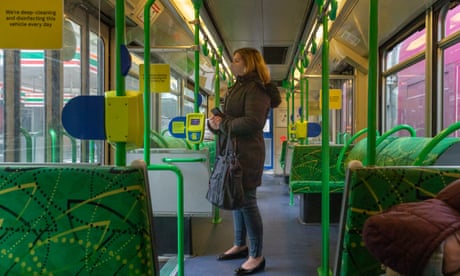- by foxnews
- 04 Mar 2025
Critics of ‘hostile’ Myki say Melbourne doesn’t need a world-beating system - just one that works
Critics of ‘hostile’ Myki say Melbourne doesn’t need a world-beating system - just one that works
- by theguardian
- 31 Dec 2022
- in news

Urban planners and commuter advocates have called for Victoria's "seriously slow" and "hostile" Myki public transport ticketing system to be replaced with one that includes all the innovations in use in other cities, such as allowing credit cards and smartphone apps to tap on.
The Myki tap-and-pay system, which is used across Melbourne's trams, buses and trains and some regional services, could be scrapped by the end of next year, with the current ticketing contract due to end in November.
On Thursday, Victoria's treasurer, Tim Pallas, acknowledged Myki was "not the world's best practice" and the state could be offering a "better customer experience than we have at the moment".
Myki was first rolled out in 2010 and fully replaced the previous Metcard system 10 years ago this week. The system was delivered more than $500m over budget and behind schedule. On Friday Martin Pakula, who was the public transport minister at the time, said it had "teething issues every day" at the start.
Early technical issues included lagging sensors on tram readers, which led to slower boarding and exit times and pushed the state government to reclassify the entire tram network as zone 1 so that users would not have to tap off when leaving a tram in order to reduce queues at stops.
While ticket sensors have been upgraded since then, the technology is still criticised for being too slow. Topping up a card using the Myki website at one time took 24 hours to take effect, although this has now been reduced to about 45 minutes.
There was also a slew of bizarre glitches. In 2011, when a commuter tried to feed a $5 note into a card recharge machine, his balance was momentarily topped up to more than $470,000.
While modern systems, such as ones in Sydney and London, accept credit cards - and tap-to-pay-enabled phones and watches - when boarding, Myki still requires a physical card, which costs $6 upfront before credit is added. A smartphone app allows Android users to tap on with their phones, but is not available for iPhones.
Public Transport Users Association spokesperson Daniel Bowen said the ability to tap on with a credit card should be a top priority for whatever system replaced Myki.
He also wants to see a single ticketing covering all of Victoria.
"If you travel to Shepparton or Warrnambool, you can't use Myki on the buses," he said.
Bowen also believes a simpler fare structure should be brought in to calculate automatically if a rider reaches a discount threshold, moving away from the current need to buy a pass in advance.
He said Sydney's Opal card system - which is based on London's Oyster card technology - already functioned in the way Melbourne's should and the state government should consider that or several other similar systems around the world rather than building a new one from scratch.
"We've fallen behind and we need to catch up, but at the same time you don't want to be too bleeding edge - that can lead to the problems we saw with Myki when it launched," he said. "We don't need to be too ahead of the pack, we just need a fundamentally simple and reliable ticketing system."
Prof Jago Dodson, the director of the Centre for Urban Research at RMIT University, urged creativity when considering a new ticketing system, away from a card-centric model.
"At launch the sensors were seriously slow, you'd end up with queues when boarding. And even now, it's hostile for a tourist who has to find a kiosk, pay $6 for a card and worry about topping it up all the time".
In addition to credit card compatibility, there should be better smartphone integration, Dodson said. He points to e-bike and e-scooter programs in Melbourne, where vehicles can be rented by scanning a QR code and a phone's GPS is used to track the trip and charge the user accordingly.
"This would mean less tapping on and off in the doorway, less fumbling for passengers and less dwell time at stops - and a faster service," he said.
Dodson said the next ticketing system should be adaptable to a future where scanners sense when a rider enters and exits, and charge them the appropriate fare without them having to tap on or off, although he acknowledged the technology for that was not ready yet.
- by foxnews
- descember 09, 2016
Bus travel sees 'steady growth' as flyers seek alternative transportation
People who ride on airplanes might rely on alternative transportation for a number of reasons. A CEO of a bus travel company shares insights with Fox News Digital.
read more


